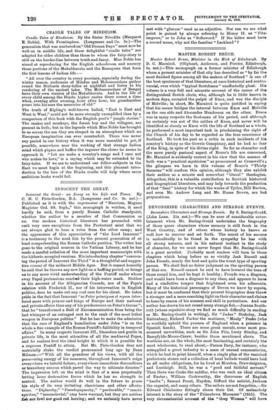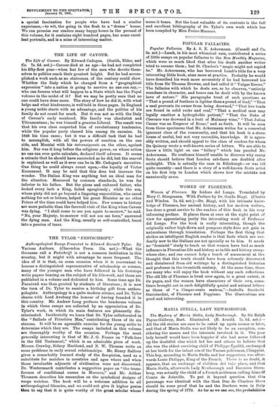DEVONSHIRE CHARACTERS AND STRANGE EVENTS.
Devonshire Characters and Strange Events. By S. Baring-Gould. (John Lane. 215. net.)—We can be sure of considerable enter- tainment when Mr. Baring-Gould undertakes the biography of those queer characters whose memory is still fresh in the West Country, and of others whose history he knows so well how to recover and set forth. The secret of his success is undoubtedly to be found in the sympathy he has with all strong natures, and in his natural instinct in the study of character, for we must never forget that Mr. Baring-Gould is a great novelist. Probably most readers will turn to those chapters which bring before us so vividly Jack Russell and John Froude, nearly the best and quite the worst type of sporting parson. We shall find no fairer judgment on the sporting parson of that era. Russell cannot be said to have lowered the tone of those round him, and he kept it healthy ; Froude was a disgrace, and would have been a disgrace to any class, and appears to have had a vindictive temper that frightened even his adherents. Many of the historical personages of Devon we know by repute, but it must be confessed that their present biographer does throw a stronger and a more searching light on their character and claims to fame by reason of his acumen and skill in portraiture. And our author has drawn his net round many strange fish,—Joanna South- c,ott (whose repulsive story we find as much difficulty in reading as Mr. Baring-Gould in writing), Sir "Judas" Stukeley, Jack Rattenbury, Richard Parker the mutineer, " Mauly " Peeke (who so worthily upheld the yeomen of England when a prisoner in Spanish hands). There are some great rascals, some most pro- nounced unworthies, such as Sir John Fitz, Lusty Stucley, and Bampfylde-Moore-Carew, besides those mentioned above. The worthies are, on the whole, the most fascinating, and certainly the most wholesome, to read about,—Parson Davy, for instance, who misapplied a great industry to a mass of unread commentaries, which he had to print himself, when a single plan of the vanished prehistoric stones and a collection of local ballads would have laid us all under obligations, for he lived at Moreton, Drewsteignton, and Lustleigh. Still, he was a "good and faithful servant." Then there was Cooke the saddler, who was such an ideal citizen of Exeter ; William Cookworthy, the discoverer of English "kaolin" ; Samuel Prottt, Hayden, Gifford the satirist; Jackson the organist, and many others. The sailors are not forgotten,—Sir Edward Chichester fittingly closes their list. Of Melancholy interest is the story of the "Princetown Massacre" (1815). The very circumstantial account of the "Grey Woman" will have a special fascination for people who have bad a similar experience,—to wit, the going in the flesh to a, "dream' house. We can promise our readers many happy hours in the perusal of this volume, for it contains eight hundred pages, has some excel- lent portraits, and is a mine of interesting matter.





















































 Previous page
Previous page